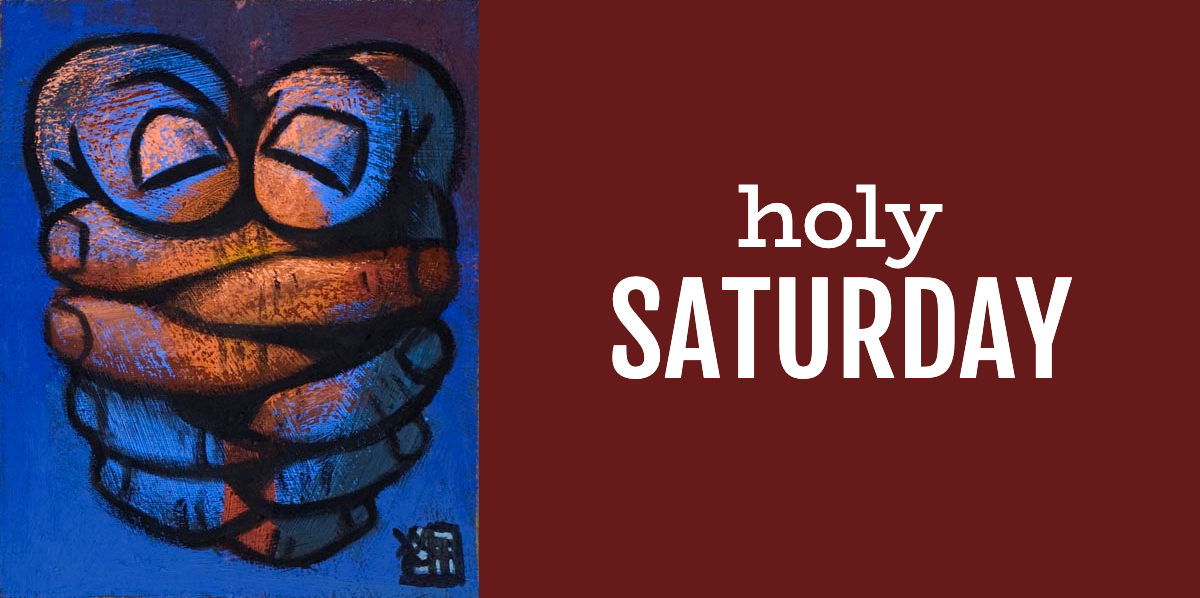A Word From Below Holy Week Devotionalنموونە


Word
“After these things, Joseph of Arimathea, who was a disciple of Jesus, though a secret one... asked Pilate to let him take away the body of Jesus... Nicodemus, who had at first come to Jesus by night, also came, bringing a mixture of myrrh and aloes, weight about a hundred pounds.” (John 19:38-42)
Made Flesh
Friday night and Saturday are perhaps the strangest time of this strange, holy week. It is the time that all falls silent. There is nothing to do but wait. And it is not a waiting for new life. No one guessed what was to come. Joseph of Arimathea and Nicodemus see to the burial, tending to Jesus’ mangled body with mercy.
I am captivated by these two disciples.
John tells us Joseph of Arimathea was a secret disciple, and he was afraid. Matthew tells us he was rich. Mark and Luke tell us he was a member of the Sanhedrin—the council that had tried Jesus just the night before. Despite all this, every gospel tells us he was good.
It’s the detail about being on the council that gets me. Mark says the whole council agreed unanimously that Jesus should be executed. Was Joseph there? Did he vote for Jesus’ death? Maybe he stayed home, let it play out the way he knew it would. Or maybe he was there, but he was afraid, so he stayed quiet. Maybe he was so afraid, or so conflicted, that he voted yes when he meant no. Whatever happened, he was part of it. But then, at Jesus’ death, Joseph used every bit of his power and privilege to bury Jesus with honor.
And Nicodemus, well, he was a slow disciple. He came to Jesus by night, John reminds us. He seemed embarrassed to be seeking Jesus out, uncertain and scared. Later, when Jesus has been teaching and offending people, so much so that the authorities wanted to arrest him, Nicodemus intervened. He, too, was part of the Sanhedrin. We can wonder the same things about his presence or absence on the night of Jesus’ trial. But then, finally, at Jesus’ death, Nicodemus comes bringing his whole self and all his resources. It took him some time, but he got there.
Joseph was scared, and Nicodemus was slow. But something—and we might as well call it grace—worked on them over time. Their fear, their hesitation, did not get the last word. Grace gave them the courage, the conviction, to do the next right thing despite what they had done or left undone before.
I find this immensely difficult. I am much more likely to be paralyzed by guilt, to wallow in shame. When I have done wrong, it takes tremendous force of will for me to repent and return. I wonder if that’s because I am trying to do it myself, rather than allowing grace to do its slow, silent work within me.
We do not know how it happened for Joseph and Nicodemus, but by the strange, tender mercy of Christ, they were transformed. On this night and day of silence and stillness, they were able to loosen their hold on their power, privilege, fear, and hesitation, and pour out their very selves in love and service. I like to think they relaxed into God’s love, which had been there all along—the love which turns our hearts from rivalry and violence to the forgiveness and peace of Jesus.
Then all falls silent. Now all there is to do is wait, watch, keep vigil.
Dwelling Among Us
Can you find time and space to be silent today? In the stillness and waiting, trust that God’s mercy is working within you.
Reflection by: Rev. Sarah Wiles
Artwork: "Prayer #1" by Wayne Forte
کتێبی پیرۆز
دەربارەی ئەم پلانە

This devotional combines reflections from Rev. Sarah Wiles and the artwork of Wayne Forte (www.wayneforte.com) to take the reader on a journey through Holy Week, beginning on Monday and ending on Resurrection Sunday. Join us as we journey through the book of John with Jesus to the cross and the empty tomb. Cover image: "Communion 2002" by Wayne Forte
More
پلانە پەیوەستەکان

Encounter: People Jesus Met, Then and Now

More Than Money

Enfolded: A Reflection on God’s Psalm 91 Promises

A Teen's Guide To: Victory in Christ

Renew: To Transform, Be Transformed by God’s Mercy

Family by Choice: God’s Heart for Family Beyond Biology

We Are Family

Can I Trust the Bible?

Why Trust the Bible?
